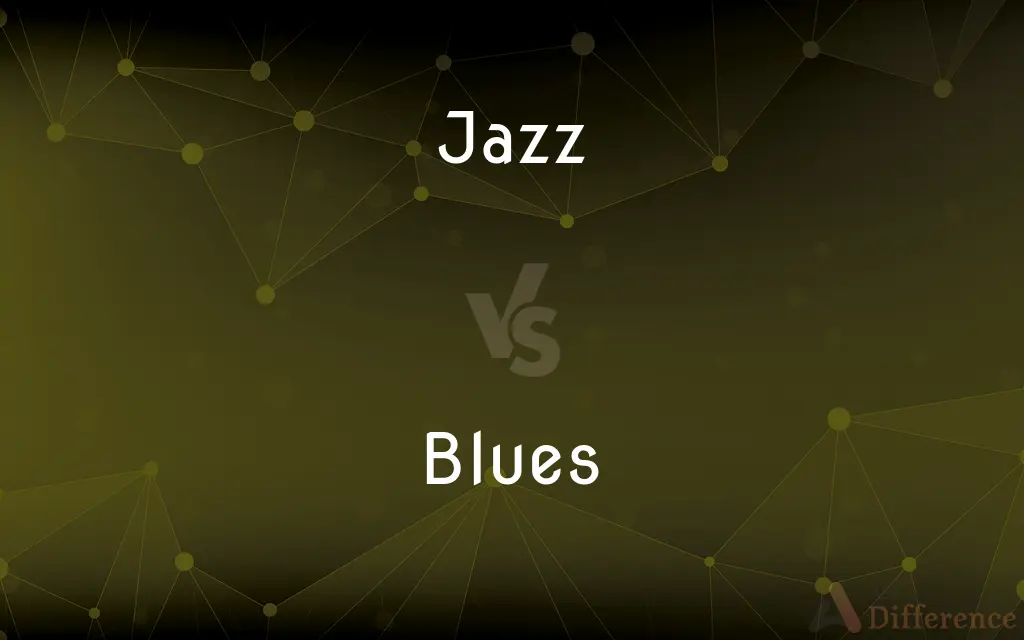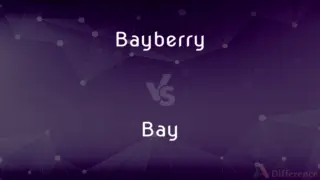Jazz vs. Blues — What's the Difference?
Edited by Tayyaba Rehman — By Maham Liaqat — Updated on March 15, 2024
Jazz is a complex music genre known for improvisation, syncopation, and swing, originating in the early 20th century. Blues, with its roots in African American spirituals and work songs, emphasizes expressive vocals and the blue note.

Difference Between Jazz and Blues
Table of Contents
ADVERTISEMENT
Key Differences
Jazz emerged in the late 19th and early 20th centuries, primarily in New Orleans, blending elements of African rhythms, European harmonies, and American band traditions. Blues, originating in the Deep South in the late 19th century, is distinguished by its use of the blue note—a note that is sung or played at a slightly lower pitch than that of the major scale for expressive purposes. Blues music typically follows a twelve-bar chord progression and revolves around themes of sorrow, heartbreak, and the human experience.
While jazz often incorporates a wide array of instruments including horns, piano, and drums to create its sophisticated soundscapes, blues music traditionally relies more heavily on the guitar, harmonica, and vocals, aiming for a more intimate and soulful expression. In contrast, the blues has remained more closely tied to its emotional roots, serving as the foundation for rhythm and blues (R&B), rock 'n' roll, and other modern music forms.
Both jazz and blues have deeply influenced each other, with blues being an integral part of jazz's development. Many jazz standards incorporate blues elements, and improvisation—a key feature of jazz—can also be found in blues performances. Despite their differences, both genres share a common heritage in African American musical traditions and have played crucial roles in the cultural history of the United States.
Culturally, jazz has been associated with innovation, sophistication, and the breaking of musical boundaries, while blues has been seen as a more fundamental expression of the African American experience. Jazz's embrace by diverse musicians and audiences worldwide has led to a proliferation of festivals and schools dedicated to its study and performance. Meanwhile, the blues has maintained a more grassroots appeal, with its emotional depth and simplicity resonating across a broad spectrum of listeners.
Comparison Chart
Origins
Late 19th to early 20th century in New Orleans.
Late 19th century in the Deep South.
ADVERTISEMENT
Key Features
Improvisation, syncopation, swing, complex chord progressions.
Expressive vocals, "blue note," twelve-bar chord progression.
Instrumentation
Horns, piano, drums, double bass, among others.
Guitar, harmonica, vocals.
Themes
Broad, from everyday life to abstract concepts.
Struggle, emotion, heartbreak.
Musical Complexity
High, with emphasis on innovation and technical skill.
More focused on emotional expression.
Influence
Influenced a wide range of music genres beyond its own.
Laid the foundation for R&B, rock 'n' roll, and more.
Cultural Significance
Associated with artistic innovation and sophistication.
Deeply rooted in the African American experience and emotional expression.
Compare with Definitions
Jazz
Known for its diverse styles from bebop to swing.
The swing era, led by bandleaders like Duke Ellington, popularized jazz worldwide.
Blues
Focuses on expressive vocals and the blue note.
B.B. King's guitar playing exemplifies the soulful sound of blues.
Jazz
A music genre emphasizing improvisation and complex harmonies.
Miles Davis is celebrated for his innovative contributions to jazz.
Blues
Relies on guitar, harmonica, and powerful vocals.
Muddy Waters is known for his deep, emotive vocal and guitar style.
Jazz
Has influenced numerous music genres.
Jazz's improvisational style has impacted rock, funk, and hip-hop.
Blues
Traditionally follows a twelve-bar chord progression.
Sweet Home Chicago is a classic example of the twelve-bar blues.
Jazz
Explores themes beyond struggle, including abstract concepts.
Thelonious Monk's compositions are renowned for their complexity and originality.
Blues
The foundation for many modern music genres.
Blues influenced the development of rock 'n' roll and soul music.
Jazz
Integrates a wide range of instruments for a rich sound.
John Coltrane's saxophone performances are iconic in jazz history.
Blues
Themes revolve around personal strife and emotion.
Etta James' I'd Rather Go Blind touches on the pain of lost love.
Jazz
A style of music, native to America, characterized by a strong but flexible rhythmic understructure with solo and ensemble improvisations on basic tunes and chord patterns and, more recently, a highly sophisticated harmonic idiom.
Blues
Blues is a music genre and musical form which was originated in the Deep South of the United States around the 1860s by African-Americans from roots in African-American work songs, and spirituals. Blues incorporated spirituals, work songs, field hollers, shouts, chants, and rhymed simple narrative ballads.
Jazz
Jazz is a music genre that originated in the African-American communities of New Orleans, Louisiana, United States, in the late 19th and early 20th centuries, with its roots in blues and ragtime. Since the 1920s Jazz Age, it has been recognized as a major form of musical expression in traditional and popular music, linked by the common bonds of African-American and European-American musical parentage.
Blues
A type of folk song that originated among Black Americans at the beginning of the 20th century; has a melancholoy sound from repeated used of blue notes.
Jazz
Big band dance music.
Jazz
Animation; enthusiasm.
Jazz
Nonsense.
Jazz
Miscellaneous, unspecified things
Brought the food and all the jazz to go with it.
Jazz
(Music) To play in a jazz style.
Jazz
To utter exaggerations or lies to
Don't jazz me.
Jazz
To give great pleasure to; excite
The surprise party jazzed the guest of honor.
Jazz
To cause to accelerate.
Jazz
To exaggerate or lie.
Jazz
(music genre) A musical art form rooted in West African cultural and musical expression and in the African American blues tradition, with diverse influences over time, commonly characterized by blue notes, syncopation, swing, call and response, polyrhythms and improvisation.
Jazz
Energy, excitement, excitability.
Jazz
The substance or makeup of a thing.
What jazz were you referring to earlier?
What is all this jazz lying around?
Jazz
Unspecified thing(s).
Jazz
(with positive terms) Something of excellent quality, the genuine article.
Jazz
Nonsense.
Stop talking jazz.
Jazz
Semen, jizz.
Jazz
To destroy.
Jazz
To play (jazz music).
Jazz
To dance to the tunes of jazz music.
Jazz
To enliven, brighten up, make more colourful or exciting; excite
Jazz
To complicate.
Jazz
(intransitive) To move (around/about) in a lively or frivolous manner; to fool around.
Jazz
To distract or pester.
Jazz
To ejaculate.
Jazz
A type of music that originated in New Orleans around 1900 and developed through increasingly complex styles, but generally featuring intricate rhythms, improvisation, prominent solo segments, and great freedom in harmonic idiom played frequently in a polyphonic style, on various instruments including horn, saxophone, piano and percussion, but rarely stringed instruments.
Jazz
Empty or insincere or exaggerated talk; as, don't give me any of that jazz.
Jazz
A style of dance music popular in the 1920s; similar to New Orleans jazz but played by large bands.
Jazz
Empty rhetoric or insincere or exaggerated talk;
That's a lot of wind
Don't give me any of that jazz
Jazz
A genre of popular music that originated in New Orleans around 1900 and developed through increasingly complex styles
Jazz
A style of dance music popular in the 1920s; similar to New Orleans jazz but played by large bands
Jazz
Play something in the style of jazz
Common Curiosities
How do the themes of jazz and blues music differ?
Jazz explores a wider range of themes, including abstract concepts, while blues focuses on emotional expression, often related to personal struggles.
How has blues music influenced other genres?
Blues has laid the groundwork for rhythm and blues, rock 'n' roll, and other genres, influencing their development with its emotional depth and musical structure.
Can jazz and blues be combined?
Yes, the genres often overlap, with many jazz standards incorporating blues elements and both styles emphasizing improvisation.
What distinguishes jazz from blues in terms of musical structure?
Jazz is known for its complex chord progressions and improvisation, while blues typically follows a simpler twelve-bar chord progression.
Why is New Orleans significant in the history of jazz?
New Orleans is considered the birthplace of jazz, where various musical traditions converged to create the genre.
What role does improvisation play in jazz and blues?
Improvisation is central to both genres, allowing musicians to express their creativity and respond to the music and fellow musicians in real time.
Why is the "blue note" important in blues music?
The blue note gives blues its distinctive sound, conveying emotion and adding depth to the music.
What instruments are typically used in jazz bands?
Jazz bands often include horns, piano, double bass, and drums, among others, allowing for a rich and varied sound.
How have jazz and blues impacted American culture?
Both genres have deeply influenced American music, culture, and social movements, reflecting the country's diverse history and societal changes.
How do jazz and blues performances differ?
Jazz performances might focus on technical skill and improvisation within complex compositions, while blues performances emphasize emotional expression and connection with the audience.
Share Your Discovery

Previous Comparison
Bayberry vs. Bay
Next Comparison
Eccentric vs. ErraticAuthor Spotlight
Written by
Maham LiaqatEdited by
Tayyaba RehmanTayyaba Rehman is a distinguished writer, currently serving as a primary contributor to askdifference.com. As a researcher in semantics and etymology, Tayyaba's passion for the complexity of languages and their distinctions has found a perfect home on the platform. Tayyaba delves into the intricacies of language, distinguishing between commonly confused words and phrases, thereby providing clarity for readers worldwide.














































